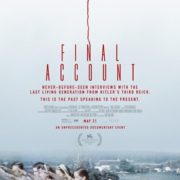Final Account
By Ben Kane
“Final Account” begins with a quote from Holocaust survivor Primo Levi. The quote does an exceptional job of summarizing the message of the film. “Monsters exist, but they are too few in number to be truly dangerous. More dangerous are the common men, the functionaries ready to believe and to act without asking questions.”
The movie explores the formative years and then the wartime positions held by those interviewed throughout the movie. Many of them were members of the Waffen SS, the military wing of the SS, an organization consisting of the most ardent Nazi fanatics. According to historical records, the military wing of the SS, unsurprisingly, had vast numbers of perpetrators within their ranks. It would be difficult for any member of the Waffen SS to consider themselves innocent, but that does not stop several interviewees from trying.
As the film unfolds, several former Nazi military personnel explain how they do not consider themselves perpetrators. The individuals claim they were “swept up” in a movement and “forced to obey orders.” They said not doing so would put them at risk. It is important to note that there are virtually no instances of a Nazi servicemember being punished for choosing not to partake in genocidal acts. Take the story of the Polish Reserve Police Battalion 101. The individuals in this group were given the chance to opt out of carrying out an act of genocide. Few refused, but those who did were not punished. One former member of the Waffen SS also corroborated the idea of a slim risk of punishment for those who refused, saying that during his time in the SS, as far as he could tell, “nobody walked away.”
There is certainly truth in their arguments of being swept up in the movement. “Final Account” does an excellent job exploring the myriad of ways citizens were brainwashed to hate. The brainwashing started at a very young age and continued ceaselessly through the years. Interviewees explained how as children, they learned the alphabet with horrific caricatures of Jews drawn beside each letter. Anti-Semitic films were shown at even the most remote villages. Marching songs, flashy outfits and rituals, and summer camps, further solidified the Nazi party as the party to join in the eyes of the impressionable youth. They were taught from birth there were those unworthy of life, and by the time a Nazi youth wielded the power of life and death as a soldier, few hesitated in using force to remove from society those they were taught were poisoning it.
Some interviewees claimed that not only did they not partake in genocidal acts, but they didn’t even know they were going on. Others admitted they did not agree with the murders but would have carried them out if asked. Conveniently, and rather miraculously, very few of the interviewed Waffen SS members seemed to be involved firsthand with any genocidal actions. Some interviewees, mostly those working office jobs or who were young members of the women’s organizations, likely didn’t carry out acts of genocide themselves, but they knew about it, and didn’t hesitate to tell that to the filmmakers.
It would be easy to direct attention to the interviewee who said Hitler was not in the wrong. That he still honors Hitler. He is shown, and it is good that he was. He serves as a warning to the viewer that some of those involved in the Holocaust were, up until their dying day, proud of their role in it. That hatred is still within the hearts of many.
But the time was instead better spent with one particularly regretful member of the Waffen SS. The film shows his conversation with a class of students, held where the Wannsee Conference took place. That 1942 conference officially determined the unfortunate fate of European Jewry. Their faces are blurred, and the comments of one young man in particular are hostile and biting. The student says he was surprised that the former SS member was “ashamed to be standing up for the fatherland” and that he “makes it seem like I should be ashamed to be German.” He also says the man “should be more afraid of some Albanian stabbing you than your fellow Germans.”
Following these remarks and others that downplayed the severity of the Holocaust, the interviewee gets emotional. He condemns the student for not showing his face and says “I belonged to a murderous organization. What else was it? We carried out murder to perfection, planned at a table like this over coffee, we decided how women and children would be killed. We cannot be proud of that… do not let yourself be blinded.”
The room fell silent. Silent just long enough for the viewer to find hope. To find hope that those led astray by even the darkest hatred can someday fight for humanity instead of against it.
Volume 75. Number 2. 2021




